Get posts by email
Figuring out Homeschooling Late Elementary
October 20, 2009
Sitting down to write out the second post on homeschooling in elementary (here is the first post on the early years) has not been easy. Now that I find myself in the groove for this year I find it harder to sit down and write about what we're doing. It's almost like I need to be going through some internal angst to get my homeschooling thoughts out.

No angst today, just fulfilling a blogging commitment I made to share my nascent experiences with the late elementary years.
I feel a bit like a fraud writing about this as Celine has just entered this stage, I guess that makes me a newbie. For my purposes I am defining late elementary as ages 10-12. From my own experience with my daughter and from speaking with friends whose children are both boys and girls it seems that a shift occurs around age 10.
In our family there is a very noticeable difference between the intellectual capabilities of our 10 year old vs. 8 year old. Much more so than between our 8 and 6 year old, who are on par in many areas of their learning. We don't compare our kiddo's achievement or learning, I'm just saying that Celine is definitely at a different stage than the other two.
So having defined late elementary I'd like to share how I anticipate our daily practice shifting during these years from very relaxed to relaxed with a bit more structure. How's that for a technical description!
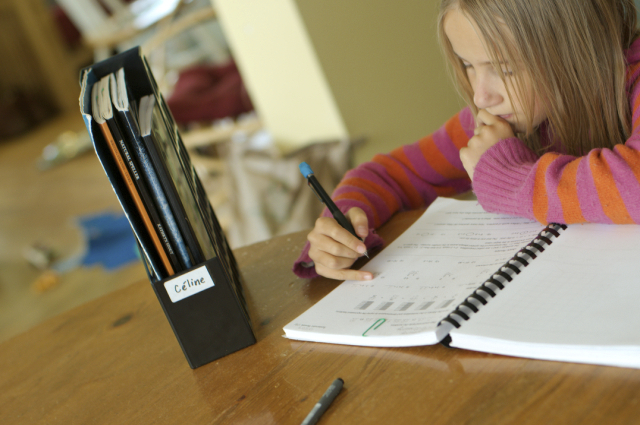
Philosophy
Firstly, our basic educational philosophy remains the same. I've described it from different viewpoints in various posts but one of the cornerstones of our family's philosophy is educational freedom to fully develop into who God intends us to be.
This applies to both our children and us adults. Gotta' say, as you hit your adult years this is both liberating and scary since now we have a family to support.
I find it easy to follow this philosophy when the children are little and I don't worry about what other kids are learning in school, could care less in fact. As we get nearer though to the young adult years I think more about equipping Celine with academic subjects so she is prepared to pursue whatever her life's goals are upon graduation.
But I don't want to swing too far to this side and lose sight of the the fact that if Celine wants to really excel at something, say sewing, she needs to be given a lot of time to do that. Time that would otherwise be spent studying Spanish, for example.
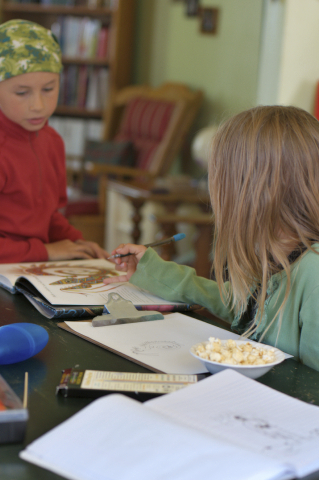
I feel as we enter next stages of homeschooling our ideals will be held in a kind of tension with the realities of college requirements should our children choose that path. But in the end it comes down to this; this is our children's education, not our own (although I'm learning a ton), and we have to walk together with them.
Giving them lots of freedom, support and time to pursue their learning goals as well as keeping an eye to their future. College and even high school graduation are not the goals. A productive and meaningful life, right now and as an adult, is the goal.
Practice
During these late elementary years my job is to balance Celine's desire (& right) for educational freedom with helping her learn and acquire the skills, experiences and knowledge that will serve her well for her future. Gosh, that sounds like a tall order. I think it sounds harder than it is though and on a daily basis I don't feel quite so intimidated.
English
When I started this school year with Celine I wanted to keep doing what was working - math, handwriting and individual reading but build and encourage her in new necessary skills, starting with composition.
Celine has never been much of a writer and we've attempted different strategies in fits and starts over the last couple years. This year we've rolled spelling practice into composition and we're following the general lesson outlines of Writing Strands level 2 to get us started, which is working really well. I've seen quite a bit of progress in just the four weeks we've been using it.
{9/2011 Update: We didn't get very far with Writing Strands. It was too prescriptive for us. We switched to everyday writing with the focus on writing to communicate. Everyday writing has been our consistent writing "curriculum" for the elementary years.}
As we go along I plan to alternate typing practice with handwriting practice especially since she is well along in that regard with beautiful cursive script.
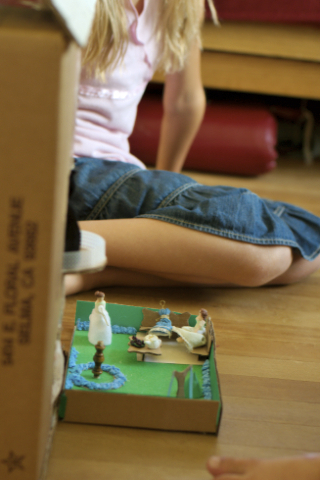
Science
I'm hoping in the next couple years to have Celine (and the younger two where appropriate) participate in some group homeschool science classes that I see advertised on our local e-mail list from time to time.
The rest of her science is covered by nature study and the discussions, explanations and learning done with the whole family. Daddy especially teaches the kids useful interest-led science at a level they can understand; basic physics & chemistry stuff. Last week they started building miniature lightsabers (you know, the Jedi Knight weapons) with switches, LED lights and batteries taken from our old printer.
This weekend we all learned about barometric pressure as Damien is getting used to his new altimeter that we'll use for hiking. We'd like our children to learn as much science as possible in a everyday living and community context, eg. the adult level wilderness first aid class she is taking with Damien the end of this month.
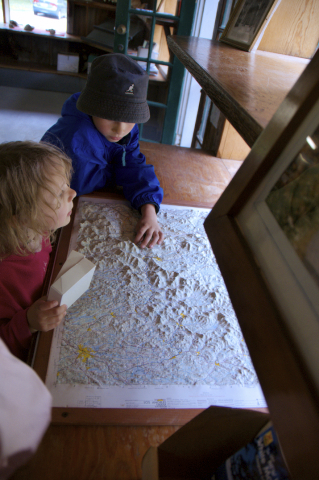
Summary
Basically, these late elementary years are a continuation of the early years with the addition of more writing (I let her choose between the options of 1) writing on her own; letters, e-mails, blog posts, whatever or 2) using guided exercises; she choose the latter), science (where applicable) and other individual pursuits.
Reading of course is how she learns about the world which covers her history, geography, and so much more. So far the kids don't have any interest in learning either music or a second language (we've exposed them to both) and we're not about to spend time and resources teaching our children something they see no use for. When and if they want to learn these, because either they want to meet college requirements or they want to learn it for their own pleasure; they'll do so.
I think of the early years as the time you establish the home learning environment and this next stage as expanding on that foundation both for the family and the individual learner. Celine knows what she likes to do (design, sew and read) and I want to give her as much time as possible to pursue those.
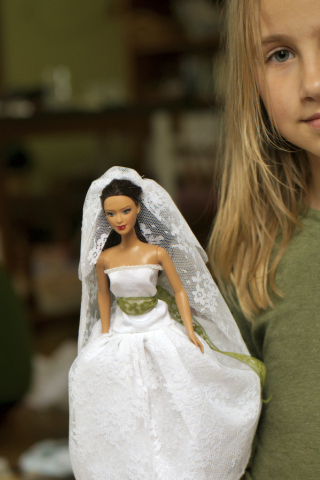
What Next?
Next up in our family's homeschool journey is the transition to high school but thankfully these are a few years away. I strongly believe that by giving my children time, freedom and the academic basics that when they reach those years they will take their home education and run with it. It truly will become their own and Damien and I will be here to guide them, find the community resources they need (classes, groups etc...) and teach what we can to help them meet their goals.
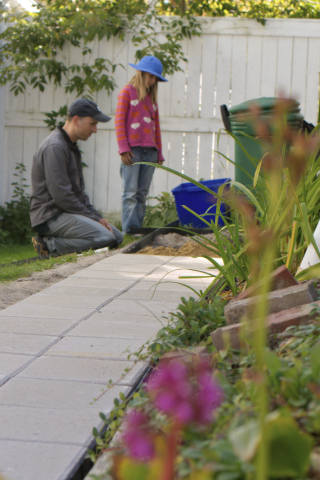
Everyday we are preparing them for their adult lives but I see the young adult years to be the culmination of this preparation and the time our children will start to spread their wings within the safety of our family, exploring further and readying themselves for adult life. Whoa, sounds exciting and a bit scary.
You can read my post on homeschooling highschoolers for more about how I envision this time of our homeschooling journey. But for now we are happily ensconsed in the elementary years and loving it!
The next, and last post in this three part series is what all this mumbo jumbo about a bit of academics and lots of freedom actually looks like in our daily lives. I will talk about our daily and weekly schedule. (post-script: that last post never did get published but you can check out my thoughts on homeschool/life schedules at Homemaking and Homeschooling.)
Filed Under
Resource Library
-

steadymom on Oct. 21, 2009, 12:27 a.m.
Love this too, Renee. Have you read any of the Thomas Jefferson Education books? Sounds like they would be right up your alley. My favorite is the one called Leadership Education: The Phases of Learning by the Demilles.
Here's an overview if you don't already know:
http://www.tjed.org/tjed/intro
steadymom's last blog post... Blog Challenge Recap : What Do You Think?
-

renee on Oct. 21, 2009, 1:15 a.m.
I haven't heard of that before. I checked it out - wow. Very neat. I'd never heard of that style of education before. Sounds very much like what we want to do...
-
-

5 orange potatoes on Oct. 21, 2009, 12:32 a.m.
Fascinated with the difference you mentioned between an 8yo and 10yo b/c I was just thinking lately about my 8yo and 6yo; thinking that they don't seem that difference. I guess I should expect a few changes in the next few years to come.
Love the homeschool posts as well. I don't care to write very much about our homeschooling, don't know why exactly, just can't put the "pen to paper" about it.
Love the family photo there at the bottom. Your parents have the warmest smiles Renee!
lisa
5 orange potatoes's last blog post... scarlet maple a-blaze!
-

renee on Oct. 21, 2009, 1:12 a.m.
Lisa, writing these posts hasn't been exactly easy, hard also for me to put my pen to paper. But I am the type of person who feels better once I've written my life down - somewhere, might as well be here and also I have a lot of people both those I meet in person and on-line asking me questions about homeschooling. By writing it all down I can send them here to find the answers.
And maybe your experience with your girls will be different, in terms of differences as they age but I remember thinking the same thing when my two oldest were 8 & 6. Except for Celine's reading, which was beyond her brother's, their interests were very similar and I felt they were close to the same stage but now there is a big difference.
-
-

shelli on Oct. 21, 2009, 2:13 a.m.
I, too, appreciate the hard work you've put into writing these posts, and I'm glad I've referenced them ony blog so that I can come back in the future when I need them!
-

Denise on Oct. 21, 2009, 2:45 a.m.
is Celine (love that name) available for sewing lessons? I could use some. One thing I know for sure, she has a mom who loves her very much and just by writing this post, it shows.
-

Nurturing the tender years on Oct. 21, 2009, 9:07 a.m.
Thank you so much for taking the time to put all this information together and share it with us. You are an amazing resource for homeschoolers (especially ones like me that are just getting started!). I just found your blog last week, but I will be stopping in daily for inspiration! :) Kami
-

Kelly on Oct. 21, 2009, 12:54 p.m.
If you would like a great resource for writing, any books by Nancie Atwell will get your daughter excited. They are not for her to read, but more for you to implement. I teach English at a small non-profit school for students who learn differently. Her strategies, take on writing, minilessons, and attitude towards learning have turned many a non-writer into a real writer. My students love writing workshop and have created everything from cookbooks to comics, short stories to poems. She is the best expert on teaching kids to love writing I have ever come across.
Kelly's last blog post... Just Sit, Mama
-

kyndale on Oct. 21, 2009, 4:39 p.m.
I also love that you put your thoughts to words. It's been very helpful to me Renee. I'm still trying to find my stride. I guess in the back on my mind I think my son won't homeschool forever. But I'm hoping he will. The writing strands look very interesting, I think I might try those lessons.
-

Kika on Oct. 21, 2009, 10:29 p.m.
I enjoy reading the details of how others homeschool. Even if we don't do things the same way, it is fun to glean ideas and inspiration. Besides, such a fascinating topic, who could resist?
-

Anonymous on Dec. 14, 2009, 6:32 a.m.
Thanks for sharing this. I have found a very relaxed, unschooly writing method I thought I would throw out to you. It is called Brave Writer. www.bravewriter.com
You can subscribe to comments on this article using this form.
If you have already commented on this article, you do not need to do this, as you were automatically subscribed.






exhale. return to center. on Oct. 20, 2009, 11:47 p.m.
i cannot tell you how much i appreciate this series of posts.
thank you!!!!!!!!
~erin
exhale. return to center.'s last blog post... what's working :: snacking camp-style